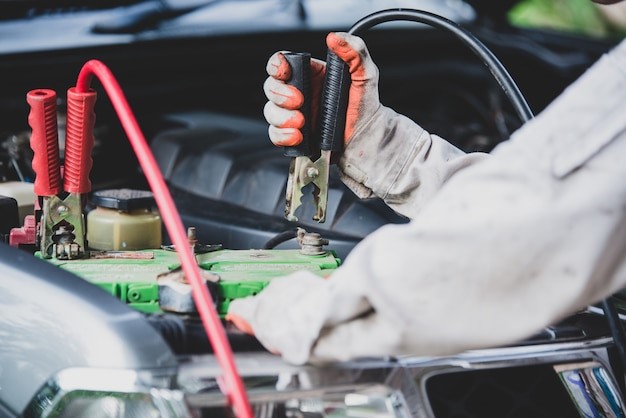Car trouble is inconvenient. But what if you could avoid the tow, the existence of a repair shop, and an entire day lost to getting your car fixed? That’s what a mobile mechanic offers — a car repair professionals who come to your vehicle. Mobile car repair is quickly becoming a preferred option for drivers seeking quality service, transparency, and convenient service options. This guide highlights what a mobile mechanic is, how they work, and how they compare to the traditional shops, so you can determine whether they’re right for your next oil change or emergency roadside fix.
What Services Does a Mobile Mechanic Offer?
Mobile mechanic gets you your vehicle repaired on site and comes in handy when you cannot get to a shop or in case of emergencies. You order them online, and they execute a variety of services whether you are at home, in the office or having problems on the road, they bring the services to your door. The following are what a mobile mechanic usually provides:
- Routine Maintenance: Oil changes, tire rotations, air filter replacements and fluid checks to have your vehicle running smoothly.
- Battery Services: Testing your battery, charging the battery and possibly replenishing it in case your car is having power problems.
- Brake Repairs: Checking out; repairing; or replacing brake pads, rotors and calipers to mean your safety on the road.
- Diagnostics and Engine Repairs: Diagnosing engine problems, scanning warning lights and performing an engine repair or tune-up.
- Tire Services: Tire changing services, flat tire repairs and even mobile tire fitting services when it comes to tire replacements or tire rotations.
Common Roadside Fixes and Emergency Services
When you become trapped and on the roadside, knowing some common roadside remedies and emergency packages can help you be back on road soon. The most popular services performed in cases of roadside emergencies are the following:
- Flat Tire Assistance: You break a tire and a road service can change the tire or you can use a tire repair to fix the tire in the meantime.
- Battery Jump-Start: In the event your car becomes inoperable because of a dead battery, roadside assistance will jump-start your vehicle and get it going again.
- Lockout Assistance: Locked out of automobile? These roadside services will assist you to have access to your car without damaging it.
- Fuel Delivery: Suffered a fuel shortage? Roadside assistance is able to deliver fuel to your location so you can get to the nearest gas station.
- Towing Services: In some cases, not all vehicles can be repaired in the field, so accompanying towing services will take the vehicle to a local mechanic or home.
- Minor Mechanical Repairs: Other roadside assistance providers can repair minor automobile malfunctions such as broken belts or other repairs that cause automobile problems.
- Winching Services: Winching services can also rescue your car in case your vehicle has been entrapped in mud, snow, or ditch.
- Cooling System Assistance: Roadside assistance can aid you in getting cool down your engine or towing your car to an auto mechanic in case the problem cannot be fixed on the roadside.
Mobile Auto Repair vs Shops
Note: everything is good but the cost and time was looking little weird that’s why i have changed them.
Cost
Mobile mechanics will have cheaper prices than those of the fix shops. This is due to the fact that they do not incur the similar overhead cost that brick-and-mortars have like rent, utilities and front-desk employees. Some of the factors that make them cheaper are the following:
- No Overhead Costs: Physical location is not a necessity which means that mobile mechanics do not have any overhead expenses hence savings which can be passed onto you.
- Lower Labor Costs: Most of the mobile mechanics operate either as individuals or in small groups and hence, they have less labor cost.
- Affordable Pricing: In most cases, the prices of services provided by mobile mechanic are cheaper than those offered at the traditional stores due to the low form of convenience fee.
The cost of overheads and labor can also be reduced significantly when the services are mobile and even with an addition of the traveling cost; mobile mechanics can still be a cheaper option in most cases.
Time
Mobile mechanics are also time-saving, mainly because they help eliminate travel time and the inconvenience that goes with having to go to a traditional auto shop. This is the way they save you time:
- No Need to Miss Work or Find Rides: Mobile mechanics will come to you avoiding taking of days off work or arranging other means of transporting your car to the shop.
- Same-Day Service: The same day repairs are common with mobile mechanics, and you won’t have to wait many days to book an appointment or to even get your car.
- Avoid Long Waitlists: It is typical of repair shops with long waitlists, particularly in the event of the more common repairs. You can eliminate such delays by using a mobile mechanic, who will work on repairing your car more quickly.
- Convenient Location: The repair specialist will fix the problem on the spot, which saves you time and effort of conveying the vehicle to a service center and spending the time waiting.
Most people will value the time it saves over any slight cost difference, so, it will be efficient and convenient to use a mobile mechanic to carry out their car repairs.
Tips for Choosing the Right Mobile Mechanic
When it comes to mobile auto repairs, it is important to find the right mechanic to attain reliable, efficient and cheap mobile auto repairs. These are some tips that can assist you in drawing a well-informed decision:
Verify Availability and Response Time: This will keep the mobile mechanic accessible to you at a time of your convenience and will quickly react in an instance of an emergency or an emergency repair.
Check Qualifications and Certifications: Be sure that you know any of the certifications that the mechanic has, including ASE (Automotive Service Excellence), or any other desired qualification. This guarantees that they are knowledgeable enough in dealing with the problems of your vehicle.
Read Reviews and Ask for Recommendations: Search customer reviews or seek the recommendations of close ones, friends or family. Positive reviews will help you in gaining confidence in the skill and professionalism of the mechanic.
Get Multiple Quotes: You do not want to be the first to call a mobile mechanic. Get quotes of the various service providers to make sure your quote is fair.
Confirm Services Offered: Ensure that the mobile mechanic offers the kind of repair or service that your need. Mechanics can specialize in certain things as other mechanics do such as engine repair or general services.
Inquire About Insurance: A good mobile mechanic must be insured in case of negligent damages or accidents. Never be afraid to ask them to give you evidence of coverage.
Ask About Travel Fees: Requesting an inquiry about travel costs is a good idea in case some mobile mechanics may be charging a travel fee based on distance. Ensure that you make this clear at the beginning of the hire so as to avoid unexpected fees.
Conclusion
Mobile mechanics aren’t just a luxury service—they are a convenient solution to everyday car problems, and even emergency repairs. Serving as an affordable alternative to traditional car repair shops, auto mechanics can perform an extensive list of auto repairs and services such as: oil changes, brakes, diagnostics, tune-ups, car part replacements, and even exterior belt and hose repair. Overall, mobile mechanics provide new options for your next car service.
FAQs
A mobile mechanic is a professional who can perform nearly all types of auto repair at your location, such as on the road, at home, or at your office.
They perform oil changes, brake service, battery replacement, diagnosis, engine tune-up, and other routine maintenance. Some also provide roadside services, including flat tire changes and jump-starts.
Yes, if the mechanic has good credentials and is of good repute. Find reviews you can trust, those with the right credentials (ASE certification, for example), and warranties on parts and labor.
Not usually. Many have prices similar to or lower than traditional stores, although some charge a modest travel fee. The overall savings and time often make it worth it.
Choose a full-service shop for large tasks (engine swaps, transmission rebuilds, or big structural damage) that contain heavy or in-shop equipment.




